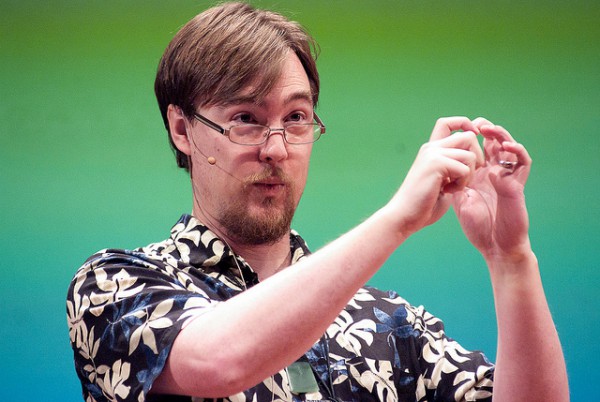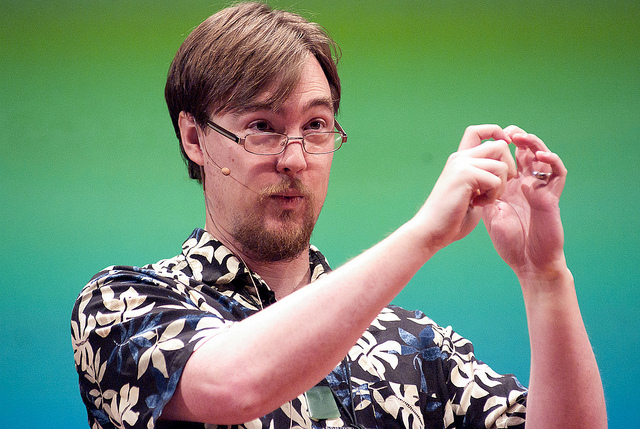
Rob Malda, known to most people on the web as CmdrTaco, the founder of early nerdy community news site Slashdot, tweeted today he is joining The Washington Post as chief strategist and editor-at-large of WaPo Labs, the digital team responsible for Trove and Social Reader.
The response on Twitter can be summed up, mostly, as “Wait, really? Whoa, cool!”
It’s a surprising hire (and a marketing coup): The Washington Post is a traditional news organization, and CmdrTaco, er, Malda, built the kind of online counterculture that wants to be an antidote to mainstream media.
“Rob is a true online media pioneer,” said Vijay Ravindran, the Post’s chief digital officer, in a statement. “The number of innovations that Slashdot brought to the online news world is hard to match — from what is still the best commenting experience on the web to creating a hyper-loyal community that led to sites referenced in Slashdot posts to being ‘slashdotted.'” (Indeed, few people can claim to have created new verbs.)
Malda left Slashdot last August after 14 years to try something — he didn’t know what — new. He talked to more than 35 companies, Malda wrote today, before falling for the Post:
[CEO] Don Graham is trying to accomplish something that is a bit of a cliche these days: A startup inside an established corporation. A group that can exist at a nexus between newspapers, websites, cable networks, and TV stations and think about the big picture and the future without the normal burdens associated with a business operating at a large scale.
I exchanged emails with Malda after the announcement to learn more about his new job, which starts today; here is our conversation.
Andrew Phelps: Why WaPo Labs/The Washington Post? What’s the appeal?
Rob Malda: The Labs team is a pretty small group, focused on some more experimental stuff. The Post itself does real, important, significant, big journalism that is really important to me personally. I want to do a job that I think matters…but the labs is actually thinking about distribution, consumption, and community…the sort of stuff that I have been working on for years, but these guys are able to blend mainstream news into the whole thing. They are a bit more skunkworks and nimble. So it’s the mixture that makes me excited.
Phelps: What will you be doing there?
“Traditional Media does important things that bloggers and tweeters DON’T do. Feet on the ground, old school journalism.”
Malda: They have a number of products in various states of deploy here: Social Reader and Trove are 2 of the biggest ones. Initially I’ll be working with those teams to help bring some of my ideas to those tools, but hopefully I’ll be able to take my interests and experience in community/social news to new products.
Phelps: What new projects are planned?
Malda: Wouldn’t YOU like to know! Obviously the short term we will focus on improving Social Reader, and getting it out onto more platforms, but beyond that, I’m looking forward to seeing where we can improve the Trove news aggregation system. I think there’s something broadly appealing there.
Malda: I retired from Slashdot really for personal reasons. 14 years is a long time, and I really felt like it was just time for me to move on. In many ways, Slashdot was my baby that had moved on and gone to college…I needed to accept that and let it live its own life, and hope it remembers to call every few weeks and tell me how it is doing. But this job is a pretty perfect place for me: I get to exercise my experience in product design, community, and social news, but in a more mainstream news arena. I really can’t wait to start contributing!
Phelps: Thanks. That Slashdot question must be getting as old as “How do you think the iPod will fare?” :P
Phelps: What strikes me is that you’re very “new media,” as much as a 14-year-old website can be new, and WaPo is “old media.” I’m not implying something bad about the latter. It’s just interesting to see you traveling in the “reverse” direction. A lot of digital people leave news organizations because they can be more nimble and create new web communities (and maybe make more money) on their own. But here you are joining a large, traditional organization.
Malda: I think those are exactly the question that the WaPo Labs is trying to answer. Traditional Media does important things that bloggers and tweeters DON’T do. Feet on the ground, old school journalism. This is important stuff to everyone, even if we don’t realize it.
You could just run a newspaper into the ground, watch revenues decline, and the sun set. But what we as a culture lose in that scenario is giant. Journalism is bigger than print. And my perspective is that The Post knows that, and they are trying to figure out ways to achieve the best from micro blogging to traditional journalism. The world needs both! I bring the other perspective here. And I think I can help.
Photo of Rob Malda by webstock used under a Creative Commons license.

